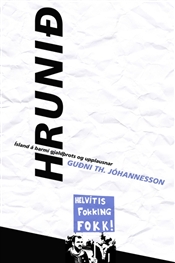The editor of the Dutch news web site www.z24.nl, Thijs Peters, wrote an interesting article today in Fréttablađiđ where he described the main reasons why the Dutch are not so happy with the cut-off date of 2024 for the IceSave guarantee. Although the article was actually published in Icelandic, I am assuming it was translated for him, so I am writing the response here in English, just in case he finds this blog and is interested in reading my response.
For reference, here is a link to the original article in Fréttablađiđ:
http://www.visir.is/article/20090925/SKODANIR/885482803
First it should be mentioned that the basic underlying facts that Thijs states in his article are more or less correct: An agreement was made and signed with government of Iceland, then Alţingi refused to accept the agreement unchanged and passed the laws with several amendments. These amendments did not change the original terms of the IceSave guarantee loan, but basically put instead a limit on the guarantee amount that Iceland would have to pay out based on future growth of the GDP. Most of the amendments are acceptable to the Dutch, but the main sticking point seems to be at the end of the loan term 2024. If the full loan amount with interest has not been paid by 2024, the countries will have take up negotiations again how any remaining amounts should be handled.
Now, for the points where I disagree with Thijs Peters:
1. Thijs states that it was not a surprise, that Alţingi would want to make changes to the agreement, due to the severe recession it is currently going through. Just that the Dutch are unhappy how the changes were made unilaterally by Alţingi after the agreement in kind of take it or leave it fashion.
Well, the reason for this unilateral action was very simple, Alţingi was not allowed to see the agreement until after it had been signed. This was originally demanded by the British and Dutch negotiators and the agreements were actually supposed to be kept secret. The intention was apparently to have the Alţingi accept the guarantee without making the agreements public. Here is an email from one of the Dutch negotiators that was published on the popular Lára Hanna´s blog:
http://larahanna.blog.is/blog/larahanna/entry/900581/
"If the suggestion of G [british negotiator suggesting to allow MP´s to view the agreement in closed room only] works, then I have no objection to it. My slight worry of making everything public, is that this may cause a lot of outside-comment that will make the discussion even more complicated. If however you really feel that your only possibility lies in making the arrangements public, I would be ready to consider that. What should be clear is that we cannot renegotiate."
It is now clear that it was a very bad idea to try to keep the agreements secret from Alţingi and the public. The Dutch negotiator actually ended up being correct. When the agreements were finally made public it did cause a lot of outside comments, with good reason as it turned out. As Alţingi was not a direct party to the negotiations, in the end it was left with only three options, either accept the agreement completely as written (which soon became clear was not possible), reject them outright, or make changes to the guarantees through the amendments.
2. Thijs and the Dutch are happy with the original IceSave agreement and think its very fair.
Unfortunately, there are a lot of people here in Iceland that are equally unhappy with it. Here is a quick list of the main problem areas that have been raised in Iceland:
- Full payment of the guarantee amount, irrespective of how much funds will be actually reclaimed from Landsbanki.
- Unrevokable and absolute responsibility of Iceland to pay the full guarantee amount, without the dispute first being resolved in front of an independent international court.
- Full payment of 5.55% interest from the beginning of 2009, even though interest payments are not recoverable from the Landsbanki bankruptcy proceedings.
- Full waiving of all legal rights and any legal defences by Iceland if any disputes arise regarding the agreement.
- Equal rate of payments to the Dutch and British deposit insurance funds from Landsbanki proceedings for deposits over 20K Euros, even though this is not correct according to Icelandic bankruptcy laws.
- Large number of possible termination events, which would make it possible to recall the full loan and start seizing Icelandic assets, even though Iceland is still current with IceSave payments.
- Full secrecy of the original agreement and the settlement terms (did not work).
- Full waiving of the sovereign rights of Iceland.
Many of these problems were not fully addressed with the amendments, but they certainly would be raised if the IceSave agreement terms would be renegotiated.
3. Thijs states that it is quite likely that there will be enough GDP growth during the period, for the loan to be fully paid by 2024.
I respectfully disagree. Iceland suffered a major body blow to its economy during the crash last year. All the banks, including the central bank had to be refinanced. Many companies in Iceland have massive debt that has close to doubled during last year, as they are either indexed to foreign currencies or inflation. Many people lost most of their savings in the market crash and have also mortgages and other loans that have increased greatly. There is also now large unemployment which did not exist before. The government which was running surplus before, is taking on a lot of debt (other than IceSave) and is now running massive deficits which will last for years.
4. Thijs states that it is unfair to other poorer countries that Iceland is not willing to pay its debts.
Its important to remember, that Iceland is only agreeing to this loan guarantee because the previous government was pressured to accept it by the EU and the IMF, without allowing the dispute to be settled first by independent international court. Unlike other countries that make the decision themselves to take a loan, typicially for some good reason, Iceland will get absolutely no economic benefit from this loan. Instead, it will have to pay for the loan guarantee from its own battered economy that is now much poorer than it was before the crash.
5. Thijs also says, that the Dutch government has shown lot of willingness to change the original loan agreement, so it will lessen the economic hardship for Iceland. If Iceland needs longer time to pay, then that would be fine, but Iceland will always have to pay the full loan amount with interest.
Except for lowering the MoU interest rate from 6.7% to 5.55% and lengthening the loan term from 10 years to 15 years, I have seen no signs of the Dutch government offering any significant changes to the loan agreement. It is not enough to offer longer payment period if the interest payments are so high, Iceland will never be able to catch up. The only real way to solve the problem will probably be to lower the interest rate enough, so the tiny Icelandic economy can actually bear it.
6. Thijs says that the British and Dutch public is also suffering and will have to pay large amounts due their own bank failures.
If the Icelandic economy does not recover it will be impossible for Iceland to pay the interest payments, let alone the principal amount. Assuming that the current estimated recovery rate of Landsbanki will be 75% for priority claimants is correct, the actual loan guarantee payments plus interest for both loans will be around 3 Billion Euros or about 10000 Euros per person in Iceland (see my last blog entry for the payment calculation). Somehow I doubt that the Dutch tax-payers will have to pay anything close to 165 Billion Euros for their bank failures, which would be the corresponding amount for them. Note also this amount is in foreign currency, not Icelandic kronas which are not worth very much anymore.
7. Finally Thijs says that it is simply too early to agree now to any reduction in payments, and we will just have to trust that the agreeable solution for Iceland will be found later if needed.
The purpose of the amendments by Alţingi are to protect the sovereign rights of Iceland, and make sure we will not be end up in a situation where we will not be able to pay our debts. Thijs wants us to leave it up to other countries to decide among themselves if Iceland suffers a sovereign default and how much it should pay. This was simply not acceptable to Alţingi.
How the original agreement was rejected, and the amendments were added, may all sound very unfair to Thijs and the Dutch, but this is unfortunately the situation as it is. Hopefully everyone now realises, that any changes to the original agreement or the amendments will have to be accepted by Alţingi, as it is the only governing body in Iceland that is allowed to accept any loan guarantees on behalf of the country, according to the Icelandic constitution.
The people of Iceland, which are already suffering greatly, are getting very tired of being pushed around and told they will have to pay for IceSave also. They certainly had nothing to do with running the banks, which were private companies with large part of their operations outside the country. The Icelandic people are willing to do their fair share, but the amounts involved here are just too staggering for such a small country. Accepting the IceSave agreement, without the amendments, would have meant putting everyone into debt for generations, with no way out.
Meginflokkur: Stjórnmál og samfélag | Aukaflokkar: Evrópumál, Fjármál, Utanríkismál/alţjóđamál | Breytt 28.9.2009 kl. 02:51 | Facebook

 marinogn
marinogn
 vidhorf
vidhorf
 frisk
frisk
 thjalfi
thjalfi
 andrigeir
andrigeir
 volcanogirl
volcanogirl
 ansigu
ansigu
 arikuld
arikuld
 arnorbld
arnorbld
 au
au
 axelaxelsson
axelaxelsson
 axelthor
axelthor
 agbjarn
agbjarn
 creel
creel
 beggita
beggita
 birgitta
birgitta
 dullur
dullur
 gudmundsson
gudmundsson
 bjornbjarnason
bjornbjarnason
 egill
egill
 einarbb
einarbb
 ekg
ekg
 naglinn
naglinn
 emilkr
emilkr
 eyglohardar
eyglohardar
 ea
ea
 fhg
fhg
 lillo
lillo
 neytendatalsmadur
neytendatalsmadur
 gudbjornj
gudbjornj
 mosi
mosi
 bofs
bofs
 mummij
mummij
 muggi69
muggi69
 hreinn23
hreinn23
 alit
alit
 tilveran-i-esb
tilveran-i-esb
 skulablogg
skulablogg
 gthg
gthg
 vinaminni
vinaminni
 gbo
gbo
 gustaf
gustaf
 gylfithor
gylfithor
 morgunblogg
morgunblogg
 haddi9001
haddi9001
 maeglika
maeglika
 harhar33
harhar33
 helgatho
helgatho
 hildurhelgas
hildurhelgas
 snjolfur
snjolfur
 astromix
astromix
 jakobk
jakobk
 kreppan
kreppan
 fun
fun
 jenfo
jenfo
 jensgud
jensgud
 johanneliasson
johanneliasson
 johannesthor
johannesthor
 jaj
jaj
 kuriguri
kuriguri
 islandsfengur
islandsfengur
 joningic
joningic
 jonl
jonl
 jonmagnusson
jonmagnusson
 jon-o-vilhjalmsson
jon-o-vilhjalmsson
 jonvalurjensson
jonvalurjensson
 juliusbearsson
juliusbearsson
 juliusvalsson
juliusvalsson
 askja
askja
 kristinn-karl
kristinn-karl
 kristinnp
kristinnp
 larahanna
larahanna
 altice
altice
 ludvikjuliusson
ludvikjuliusson
 ludvikludviksson
ludvikludviksson
 lydurarnason
lydurarnason
 elvira
elvira
 mixa
mixa
 njallhardarson
njallhardarson
 offari
offari
 omarragnarsson
omarragnarsson
 pallvil
pallvil
 reynir
reynir
 salvor
salvor
 fullvalda
fullvalda
 duddi9
duddi9
 sigurbjorns
sigurbjorns
 sjonsson
sjonsson
 sigurdurkari
sigurdurkari
 siggisig
siggisig
 ziggi
ziggi
 stebbifr
stebbifr
 svavaralfred
svavaralfred
 sveinnt
sveinnt
 saemi7
saemi7
 saevarh
saevarh
 theodorn
theodorn
 valdimarjohannesson
valdimarjohannesson
 thjodarheidur
thjodarheidur
 thorsaari
thorsaari





Athugasemdir
Var ekki búinn ađ lesa Fréttablađiđ í dag.
*ákvćđiđ er heimilar gjaldfellingu lánsins, vegna annarra lánavandrćđa -
er einnig mjög stórt atriđi í mínum augum.
Kv.
Einar Björn Bjarnason, 25.9.2009 kl. 22:14
Sammála,
ţetta var ţađ sem ég átti viđ í punkti númer 6 í IceSave vandamála-listanum.
Bjarni Kristjánsson, 26.9.2009 kl. 01:12
Bćta viđ athugasemd [Innskráning]
Ekki er lengur hćgt ađ skrifa athugasemdir viđ fćrsluna, ţar sem tímamörk á athugasemdir eru liđin.